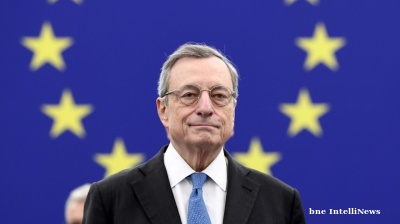It had looked like a triumph.
When the two-time Polish prime minister and former European Council President Donald Tusk announced his return to the grind of domestic politics two years ago, it seemed that the days of the ruling Law and Justice (PiS) were numbered.
Tusk’s comeback quickly put vigour back into his old party, the centre-right Civic Platform, whose Civic Coalition grouping had fallen 18pp behind the radical rightwing PiS in the polls and had even been overtaken by the now largely featureless newcomers of the centrist Polska 2050 party. But back then, Polska 2050 had looked fresh and promising; Civic Platform had looked old and done for.
“The most important thing is to regain faith,” Tusk said as he took over his party’s leadership. Faith, he added, in agency and the eventual victory.
Faith Tusk did restore but, just over five weeks before the election, the road to end PiS’ rule remains as steep as ever.
Warsaw calling
For a while in June, it looked like Tusk had achieved a turning point. At his command, more than half a million people turned up in Warsaw in the biggest rally in a generation.
“You're all here because you have just believed we can win. Democracy dies in silence. As of today, the silence is no more,” Tusk told the tightly packed crowd on Warsaw’s Castle Square. A roar of applause followed.
Suddenly, friendly media and Tusk’s Twitter army known as “Silni Razem” (together strong) began talking about “the overtake”, the passing of PiS in the polls, which would have been the first in nearly a decade. That is yet to happen: PiS leads the polls with an average of 38%, according to Politico Europe's Poll of Polls.
Tusk is an old hand in Polish politics, not as much due to his age – he is 66 and, a jogger and footballer, he looks several years junior to his birth certificate – but due to experience.
He has been in positions of power since 1991, when, then just 34, he won a seat in the first free election, running from a party he had co-founded, the Liberal-Democratic Congress, a very early version of what would morph into Civic Platform 10 years later.
The pinnacle of Tusk’s political career in Poland came in 2007. He led Civic Platform to a massive election victory over PiS that elevated him to the post of prime minister until 2014.
Then came Tusk’s top flight globally. He left Poland to become the European Council president, a job he held for another five years until late 2019. As he rubbed elbows with Barack Obama and others at G7 summits, Tusk looked from afar on the demise of his party and the takeover of public life by PiS, which had won the first of its – so far – two terms in office in 2015.
Working for €1
PiS had exploited to the max the unflattering legacy of Tusk’s time at the helm of the Polish government: high unemployment, ultralow wages, income inequality – in short, the frustration of millions that Poland’s “green island” – Tusk’s own words to describe how well Poland had fared during the global financial crisis in 2007-08 – was for the few, not the many.
The memory of having to work for hourly rates below €1 cuts deep with many Poles today (the minimum hourly rate today is €5). To make sure it does not fade, PiS keeps telling them their destitution was all Tusk’s doing. “The prime minister of Polish poverty,” goes one of PiS’ campaign lines in 2023.
Supercharged by PiS, Poland’s political polarisation sees Tusk viewed as the saviour of Polish democracy by his backers and an aloof representative of the elite by the ruling camp. This elite, in the propaganda of PiS, is not so much Poland’s but Germany’s or Russia’ or both.
PiS habitually throws charges of Tusk being virtually an agent of foreign influence. Tusk was supposed to increase the retirement age in Poland after consulting then-German Chancellor Angela Merkel (a claim that does not hold water).
He had also failed to see through Russia President Vladimir Putin, PiS claims, and there are thinly veiled accusations of him letting Moscow get away with the responsibility for the 2010 crash of Polish presidential plane with then-President Lech Kaczynski, his wife Maria, and 93 other people onboard (another claim lacking credibility).
Tusk’s black legend – made up of both real failures of his rule and the largely fabricated or grotesquely exaggerated claims by PiS propaganda – has prevented him from breaking through the glass ceiling of Civic Platform support, which had looked possible when crowds cheered him on in Warsaw in June.
The money's there now
Not that Tusk has not learned a thing or two. Ever the ruthless political player – a backstage trait examined in press articles and books for years now that is vividly in contrast to his public persona of dad and granddad that you can see on Instagram – Tusk has understood that beating PiS will take something he had shunned: populism.
In that vein, Tusk has now proposed what the “old” Tusk would not have: a plethora of promises, from doing away with taxing pensions to handing out a monthly PLN1,500 (€323) for working mothers to pay for childcare; from free-of-charge in vitro fertilisation to a 30% pay rise for teachers.
That is quite a change for a politician whose previous rule is often boiled down to “there is no money and there will be no money”, an infamous line by his then finance minister in reaction to PiS’ plans for the introduction of a monthly child benefit for anyone under 18. The billions Tusk did not see then, he appears to have found now.
There are limits to what Tusk can do on the campaign trail. He has to show restraint in attacking rival opposition parties – the glass ceiling appears too thick to break through on his own, much less so if more anti-PiS forces press against it.
Recent polls that have put Tusk’s party at roughly 28% of support give him a chance to lead the next government but only if the Left alliance and the Third Way (a centrist coalition of Polska 2050 and the agrarian party PSL) come in at 10% or so each.
For his duel with PiS, however, Tusk knows that turning up the heat in the few weeks that remain before Poles go to the polling stations on October 15 is the strategy to pursue.
“The lawful and the just,” Tusk said sourly on X (Twitter) this week, alluding to the ruling party’s full name that contradicts the scandals it has wallowed in. “Makes me wanna throw up,” Tusk added.
Features

Russian e-commerce giant Wildberries goes on a mysterious M&A spree
Russian e-commerce giant goes on M&A spree Almost a year after the controversial merger with a leading outdoor advertising firm, Russia’s leading e-commerce site Wildberries is indulging in a fresh bout of eyebrow raising deals.

US expands oil sanctions on Russia
US President Donald Trump imposed his first sanctions on Russia’s two largest oil companies on October 22, the state-owned Rosneft and the privately-owned Lukoil in the latest flip flop by the US president.

Draghi urges ‘pragmatic federalism’ as EU faces defeat in Ukraine and economic crises
The European Union must embrace “pragmatic federalism” to respond to mounting global and internal challenges, said former Italian prime minister Mario Draghi of Europe’s failure to face an accelerating slide into irrelevance.

US denies negotiating with China over Taiwan, as Beijing presses for reunification
Marco Rubio, the US Secretary of State, told reporters that the administration of Donald Trump is not contemplating any agreement that would compromise Taiwan’s status.




